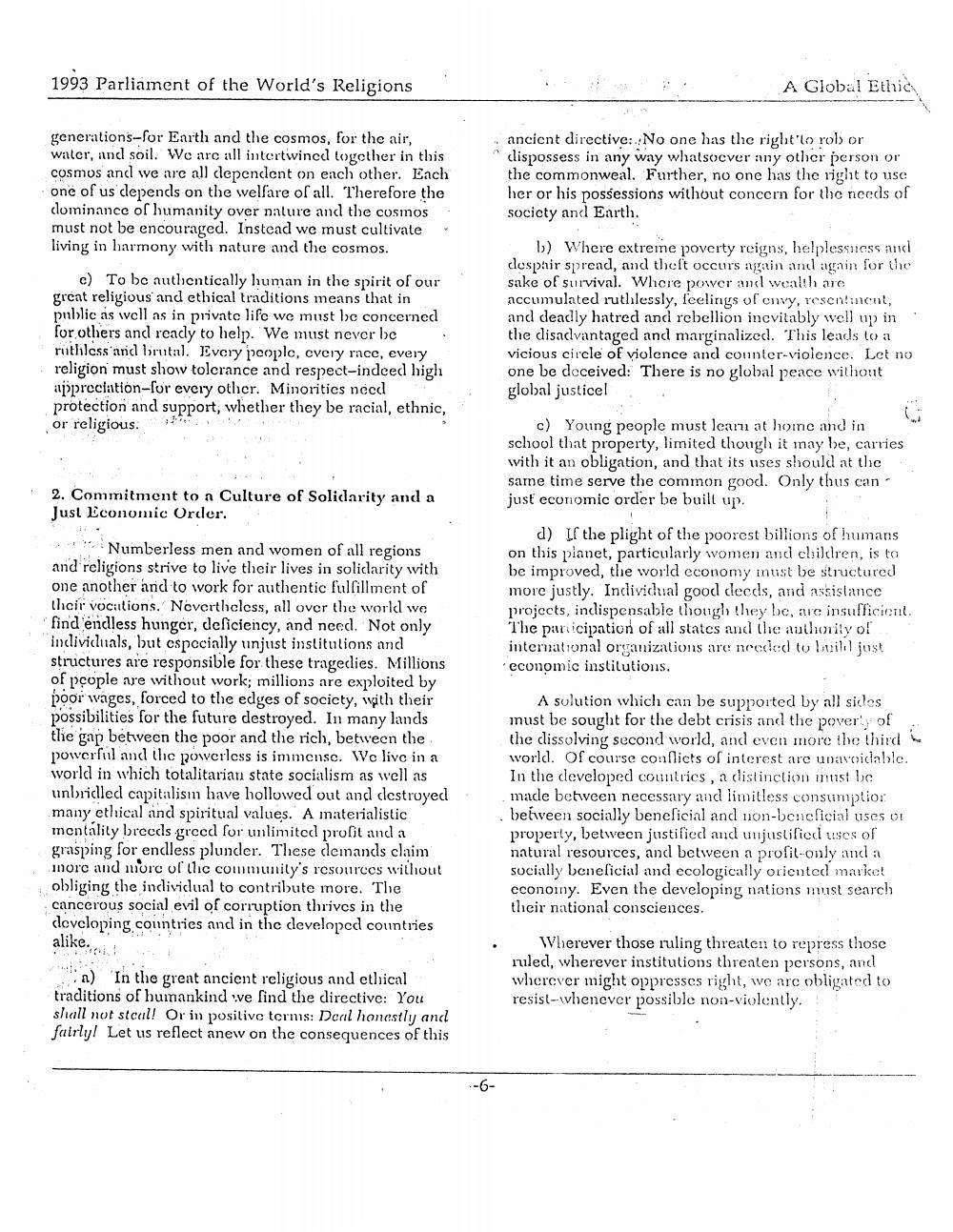Book Title: Principles Of A Global Ethic Author(s): Publisher: View full book textPage 5
________________ 1993 Parliament of the World's Religions A Global Ethic generations-for Earth and the cosmos, for the air, water, and soil. We are all intertwined together in this cosmos and we are all clependent on each other. Each one of us depends on the welfare of all. Therefore the clominance of humanity over nature and the cosmos. must not be encouraged. Instead we must cultivater living in harmony with nature and the cosmos. ancient directive:.:No one has the right to rols or clispossess in any way whatsocver any other person or the commonweal. Further, no one has the right to use her or his possessions without concern for the needs of society and Earth. e) To be authentically human in the spirit of our great religious and ethical traditions means that in public as well as in private lifc we must be concerned for others and ready to help. We must never be ritlilcss'anid brutal. Every people, cvery race, every religion must show tolerance and respect-indeed high appreciation-for every other. Minorities need protection and support, whether they be racial, ethnic, or religious b) Where extreme poverty reigns, helplessness and clespair spread, and theft occurs again and again for the sake of survival. Where power and wealth are accumulated ruthlessly, feelings of envy, rosenlinent, and deally hatred and rebellion inevitably well up in : the disaclvantaged and marginalized. This leads to a vicious circle of violence and counter-violence. Let no one be deceived: There is no global peace without global justicel c) Young people must learn at home and in school that property, limited though it may be, carries with it an obligation, and that its uses should at the same time serve the common good. Only thus can just economic order be built up. 2. Commitment to a Culture of Solidarity and a Just Economic Orier. d) If the plight of the poorest billions of humans on this planet, particularly women and children, is to be improved, the world economy must be structured more justly, Individual good deeds, and assistance projccts, indispensable though they bc, arc insufficient. Tlie pariicipation of all states and the authority of. international organizations are needed to buill just economic institutions. Numberless men and women of all regions and religions strive to live their lives in soliclarity with one another and to work for authentic fulfillment of their vocillions. Nevertheless, all over the world we find endless hunger, deficiency, and need. Not only "inclividuals, but especially unjust institulions and structures are responsible for these tragedies. Millions of people are without work; millions are exploited by poor wages, forced to the edges of society, with their possibilities for the future destroyed. In many lands the gap between the poor and the rich, between the powerful and ihe powerless is immense. We live in a world in which totalitarian state socialism as well as unbridled capitalism have hollowed out and clestroyed many ethical and spiritual values. A materialistic mentality breeds greed for umlimited prosit and a grasping for endless plunder. These clemands claim morc and morc ofllic community's resources without obliging the individual to contribute more. The cancerous social evil of corruption thrives in the developing countries and in the developed countries alike.ro! ia) In the grent ancient religious and ethical traditions of humankind 've find the directive: You shall not stcul! Or in positivc termis: Deal honestly and fairly! Let us reflect anew on the consequences of this A solution which can be supported by all sides inust be sought for the debt crisis and the povert, of the dissolving second world, and even more the third world. Of course conslicts of interest are unavoidable. In the developed countries, a distinction must be made between necessary and limitless consumption . between socially beneficial and uon-beneficial uses or property, between justified and unjustisiecl uses of natural resources, and between a profil-only and a socially beneficial and ecologically oriented market economy. Even the developing nations must search their national consciences. Wherever those ruling threaten to repress those ruled, wherever institutions threaten persons, and wherever might oppresses right, we are obligated to resist-whenever possible non-violently.Page Navigation
1 ... 3 4 5 6 7 8
